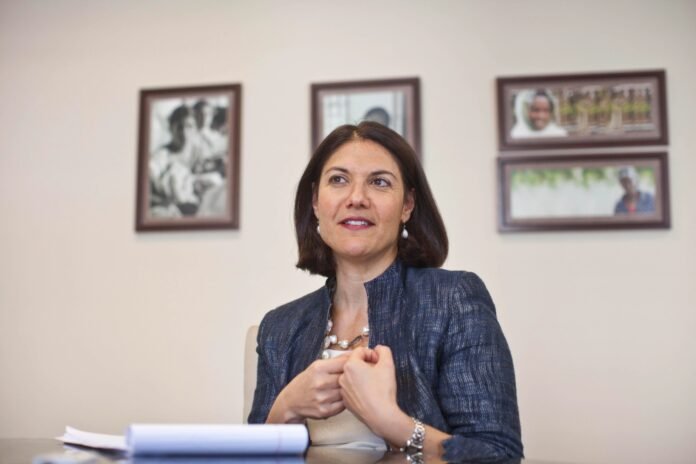Mary Ellen Iskenderian: Championing Women’s Economic Empowerment
Mary Ellen Iskenderian, the President and CEO of Women’s World Banking, has been a pivotal figure in the global movement for women’s economic empowerment. Under her leadership, this New York-based nonprofit organization has dedicated itself to providing small loans to women-owned businesses around the world. Iskenderian’s vision extends beyond mere financial assistance; she aims to create a world where women have equal access to resources and opportunities, enabling them to thrive in their entrepreneurial endeavors.
In a recent interview, Iskenderian emphasized the urgency of addressing pressing global issues such as gender parity, financial inclusion, and climate change. The recent air quality crisis in New York City, exacerbated by Canadian wildfires, serves as a stark reminder of the interconnectedness of these challenges. As the fintech sector continues to evolve, leaders like Iskenderian are calling for a more proactive approach to tackle these issues head-on.
The Intersection of Fintech, Gender Parity, and Climate Change
The Women’s World Banking’s "Making Finance Work For Women Summit" held in Mumbai, India, brought together leaders from various sectors to discuss how fintech can empower women economically. The summit highlighted the critical role that financial inclusion plays in enabling women to invest in clean technologies and lead environmentally conscious initiatives. Iskenderian pointed out that without immediate action, gender disparity and climate change could persist for generations.
Currently, women occupy only 15% of leadership roles in finance and a mere 11% in technology. This lack of representation not only stifles women’s economic potential but also hampers efforts to combat climate change. Iskenderian’s impatience for change reflects a broader sentiment among advocates for gender equality: the time for action is now.
The Role of Climate Fintech
In 2022, climate fintech startups attracted $2.9 billion in funding, signaling a growing interest in leveraging technology to combat climate change. However, the impact of these startups may take time to materialize. In the meantime, engaging in environmental, social, and governance (ESG) investing offers a more immediate solution. Fintech tools have advanced ESG investing, allowing individuals and institutions to make informed decisions about their investments.
Platforms like Physis Investment enable investors to assess potential investments based on their ESG performance, particularly regarding gender equality and climate action. Women’s World Banking’s Capital Partners Fund exemplifies gender-lens investing, evaluating companies on their commitment to gender diversity and female leadership representation.
Challenges and Opportunities in ESG Investing
While ESG investing has gained traction, it is not without its challenges. Critics argue that relying solely on market solutions may lead policymakers to overlook the need for government intervention in addressing climate change. Additionally, ESG investments can sometimes sacrifice returns, particularly when excluding fossil fuels or prioritizing climate mitigation.
However, gender-lens investing presents a unique opportunity. As Christina Juhasz, Managing Partner at Women’s World Banking Asset Management, notes, diversity correlates with growth. Gender-lens investing focuses on companies that are women-founded or led, those that offer products beneficial to women, and those that practice inclusivity in the workplace.
Government Policy and Gender Equality
Government policy plays a crucial role in advancing gender equality and addressing climate change. Germany serves as a prime example, where gender equality is a fundamental aspect of foreign policy. Michael Brill, Senior Portfolio Manager at KfW Development Bank, emphasizes that gender lens investing is a tool for reducing inequity, aligning with the country’s commitment to sustainable development.
KfW Development Bank has dedicated a significant portion of its investments to gender equality, with 85% of its portfolio having gender equality as a significant objective. Brill argues that having women in leadership positions within government agencies is essential for implementing policies that align with gender lens investing.
The Path Forward
As the fintech industry continues to evolve, it must remain committed to addressing the pressing challenges of gender disparity and climate change. Investing in women is not just a moral imperative; it is a strategic necessity for achieving sustainable economic growth and environmental resilience. The urgency of the moment calls for innovative solutions, collaborative efforts, and a steadfast commitment to creating a more equitable world for all.
In this rapidly changing landscape, the voices of leaders like Mary Ellen Iskenderian will be crucial in driving the conversation forward, ensuring that women’s economic empowerment remains at the forefront of global initiatives.

